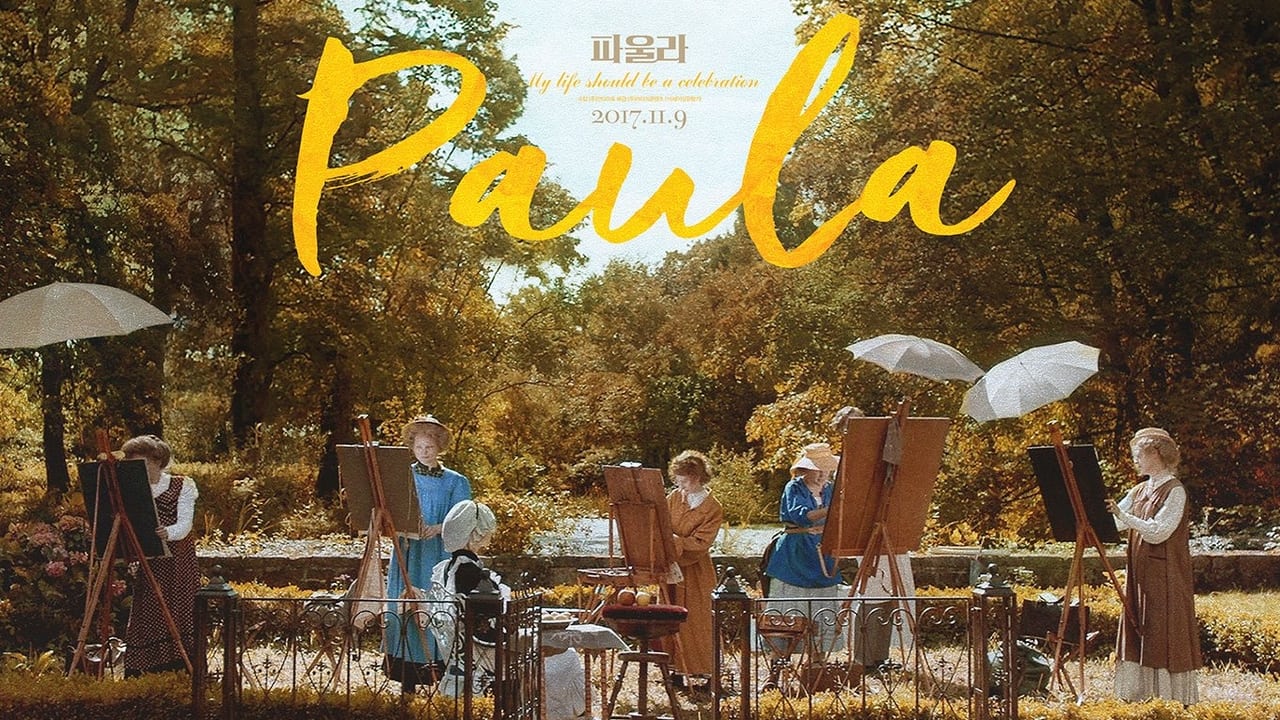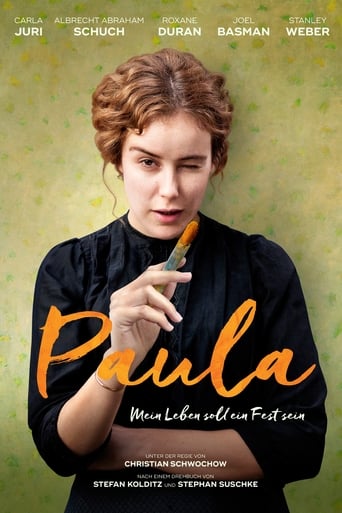



Very well executed
Just so...so bad
Great Film overall
It's the kind of movie you'll want to see a second time with someone who hasn't seen it yet, to remember what it was like to watch it for the first time.
View MoreThe movie "Paula" succesfully portraits the life of german artist Paula Modersohn Becker. At the same time it gives you an idea of how female artists were mistreated and mocked in the very beginning of 1900. The movie keeps up close to the reality of the artists life and can be used as a documentary.The personality of the artist couldn't be performed better. Carla Juri perfectly plays both Paulas playful character and her headstrong side.The movie creates a mood, which catches the viewer. It includes some very intense scenes and won't leave you untouched.
View More"Paula" is the most recent work by still relatively young German filmmaker Christian Schwochow. He is mostly known for the collaborations with his mother Heide in the past, but this one we have here has a chance of becoming his most known solo work. "Solo", however, is relative in this context, as he was not the man in charge of the script either this time, but it was written by the pretty experienced Stefan Kolditz and rookie writer Stefan Suschke. "Paula" received some solid awards attention here in Germany, including a Bavarian Film Award for its cinematography and a German Film Award for its production design. These are exactly those categories where you would expect a film to succeed that is mostly about the life and fate of a artist, i.e. painter in this very case. The movie runs for over two hours, which is really long indeed and sadly they did not manage to make such a long film without occasional lengths and dragging.The title character is played by Carla Juri and I must admit there are previous performances by her that I found really unappealing, so I was a bit surprised that I somewhat liked her in here and that she did not have too many moments where I found her embarrassing and over the top. The film may be in the German language, but there are still more French and Swiss actors in here, also in core positions. My favorite smaller performances was perhaps Nicki von Tempelhoff, who was a bit of a main antagonist in here, but left a decent impact in the audiences' minds, especially in relation to his screen time. A big part of the film was about the discrimination against women back then at the very end of the 19th century and while this was done okay at times the way it was displayed, it also lacked sufficient talent at other times when it felt just for the sake of it. I wouldn't really blame the actors though, more like the context. The title character Paula Modersohn-Becker really did exist in fact and makes this a more relevant film than it would have been with an entirely fictitious protagonist. But it also makes it more of a missed opportunity as I personally did not feel this was a captivating biopic for any reason or did a fair tribute to PMB. Looking at her extremely prolific life in these short 30 years, she would have deserved better I guess. It may be a mix between the disappointing script and Juri's occasionally underwhelming performances. I still would say that people who like biopics about painters can check this out, but only if they have seen stuff like "Renoir", "The Girl with the Pear Earring" or "Egon Schiele". And don't have too high expectations as this one is really only for genre lovers. From a general perspective, I give it a thumbs-down. Not recommended.
View MoreBeing a woman has never been a matter of course, being a woman and an artist even less so, particularly when like Paula Becker, you try to impose a personal, unconventional, "un-womanly" style in a narrow-minded environment.It therefore comes therefore as no surprise that Christian Schwochow, a director who loves women, grasped the subject and dealt with it with gusto. Remember the insecure actress of 'Die Unsichtbare' (2007) as well as the two female defectors from the GDR of 'Novemberkind' ('08) and 'Westen" ('13). To these sensitive portraits of sensitive women is now added that of Paula Mendersohn-Becker (1876-1907), a German painter and one of the most important representatives of early expressionism.Simply entitled 'Paula', the film is quite worth seeing for several reasons, the first being its documenting the life of a major artist little known outside Germany, at least until 2016, when a significant part of her 750 paintings and 1,000 drawings was displayed at the Paris Museum of Modern Art and a biography by Marie Darrieusecq published. Let us say that with this well-made and well-written movie, a new stone is added to the edifice of her memory. Plotwise, we are invited to follow the final seven years (1900-1907) of Mendersohn-Becker's life, from the time of her reluctant studies of neo-academic art at the Worpswede colony of artists to her untimely death at age 31 nineteen days after giving birth to her daughter.'Paula' is a biopic indeed and as such reports the events in the painter's life faithfully (or nearly so as a few facts have been changed for the sake of narration): her friendship with sculptress Clara Westhoff and poet Rilke, her long unconsummated marriage with painter Otto Mendersohn and playing stepmother to his daughter Elsbeth, her running away to Paris, having an affair there with a French drawing master, her returning to Worpswede, her painful delivery and unbearable death. But what really lifts the movie above the standard life story is Swochow's constant effort to understand and make us understand Paula's artistic approach while at the same time making an artistic object of his tribute film. The director indeed manages as well to show Paula creating her work under our eyes (she strikes the canvas, spreads the painting with her thumb, scratches it with a knife, sometimes even splits and cuts it) as to capture the beauty of the Worpswede region of flat plains, swamps and forests of birches. Kudos, in passing, to cinematographer Frank Lamm who finds cinematic equivalents to famous paintings of the time (Otto Modersohn's : 'Birches in the Moor' , Hans am Ende's 'Autumn in the Moor', etc.).Psycholologically speaking, 'Paula' proves equally satisfying. This 'Portrait of a Lady' met with narrow-mindedness, prejudices, machismo... actually does not lack edge. All the less as Schwochow has found the actress ideal for the role, the Italian-Swiss Carla Juri. Not only is her physical appearance close enough to her model but she immerses herself in her role so intensely that she manages to replicate with stunning accuracy Paula's personality and feelings (known from the letters and journals she left behind): she can be in turns youthfully spontaneous, impish, coquettish, abandoned to love, idealistic, sweet, tough, brooding, furious, unjust...She is well supported by a competent cast, especially by Albrecht Schuch in par with her in another complex role, that of her husband Otto, evolving throughout the story: he too is convincing in the various stages of his life with Paula; as a lover, a husband with a problem, a victim and finally an admirer of his wife's work. Also notable is the performance of Roxane Duran ('The White Ribbon') as Clara, Paula's best friend.To make a long story short, if you have nothing against a beautiful, documented, intelligent, moving work about an engaging woman ahead of her time, do not hesitate, 'Paula' is for you.
View More